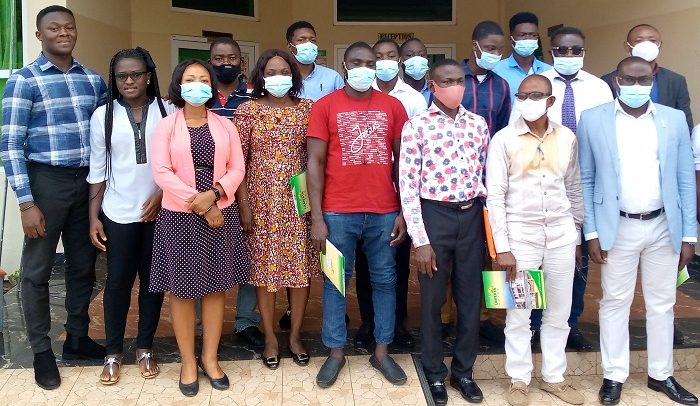Some of the participants after the workshop
THE KUMASI Metropolitan Assembly (KMA) has organised a day’s training workshop for the media, assembly members, market queens, transporters, civil society groups and technocrats to share creative ways of deepening citizen engagement during the COVID-19 crisis.
Citizen engagement is an approach that helps local governments to improve service delivery, public financial management and good governance.
But the coronavirus’ attack has globally halted the implementation of planned activities geared towards improving the lives of people, and making citizen engagement a little difficult due to fear and panic on the part of citizenry.
Kwadwo Akuamoah Boateng, the Coordinating Director of the assembly said these when he spoke on behalf of Osei Assibey Antwi, KMA’s Chief Executive Officer, at the workshop organised under the VNG International Sponsored Deals project in Kumasi.
He said the KMA was working tirelessly to engage the citizens to help improve the development of the city, but admitted that there had been lapses in actively getting people on board.
“We can all admit that before this pandemic, the assembly’s way of engaging citizens had no restrictions whatsoever but due to the various restrictions from the government, engagement of citizens has been challenging in these times,” he stated.
In his view, the assembly needs effective partnership with civil society, relevant stakeholders, advocates and development partners, to come together and help find ways to deepen citizen engagement in order to foster the implementation arrangements of the Deals programme to achieve SDG 11 (safe, resilient and sustainable cities).
The KMA official insisted that citizens play a vital role in advocating and helping public institutions to be more transparent, accountable and effective, which contributes to the development of every country.
He observed that COVID-19 pandemic has greatly caused much damage to the economic growth of many countries, affecting the living standards of people and bringing about changes in how people live their lives now.
This, he added, calls for countries to strengthen their preventive and control measures with various protocols which have also been initiated by the Government of Ghana to protect the general public.
Mr. Prince A. Anokye, a senior lecturer at the Kwame Nkrumah University of Science and Technology (KNUST), who took the participants through some presentations on COVID-19, said the workshop aimed at getting the message through to the actors who are very much exposed to the risk of contracting the virus.
He said the organisers looked at four groups of people who normally have contacts with people every day, namely; drivers and their conductors, market women, food vendors or restaurant operators and scrap dealers.
These people, he said, have daily interactions with others which necessitated their choice for the workshop to educate them so that they could also educate their people on the dangers of the virus to achieve widespread behavioural change.
FROM David Afum, Kumasi


